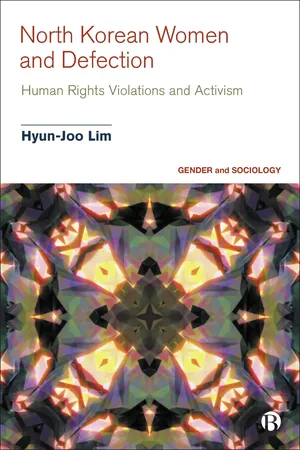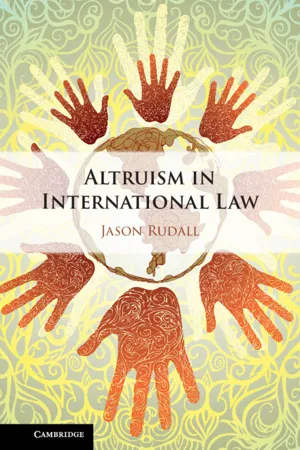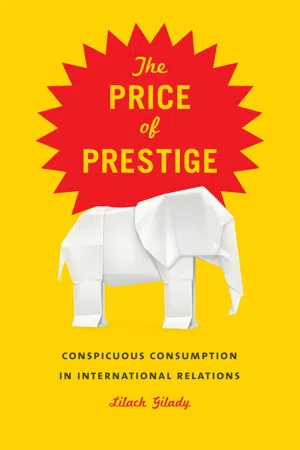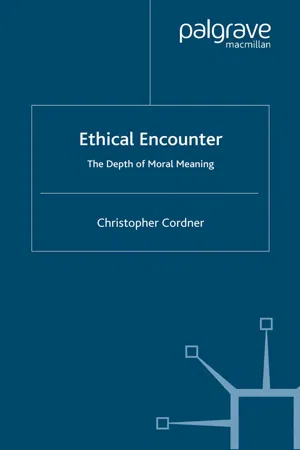Politics & International Relations
Altruism
Altruism refers to the selfless concern for the well-being of others, often at the expense of one's own interests. In the political and international relations context, altruism can manifest in policies and actions aimed at promoting the welfare of other nations or addressing global challenges, without seeking direct benefits for one's own country. It is a concept that emphasizes cooperation and empathy on a global scale.
Written by Perlego with AI-assistance
Related key terms
1 of 5
4 Key excerpts on "Altruism"
- eBook - ePub
North Korean Women and Defection
Human Rights Violations and Activism
- Hyun-Joo Lim(Author)
- 2023(Publication Date)
- Bristol University Press(Publisher)
Sliwinski, 2009 , p 31) – which allows us to experience another’s pain as our own and this can trigger a collective act.Altruistic Political Imagination
The ideas of caring for others and reciprocity lead to the concept of Altruism. The term was first coined by Auguste Comte in 1851 (Scott and Seglow, 2007 ), borrowed from the Italian word altrui , meaning ‘others’, which originates from the Latin alteri (Teske, 1997 , p 73). In Comte’s definition, Altruism refers to an act that is antithetical to egoism (Twemlow, 2017 ), and thus its central tenet is to prioritize the interests of others over those of the self (Scott and Seglow, 2007 ). Bar-Tal (1986 , p 5) delineates five pivotal components of Altruism: ‘altruistic behaviour (a) must benefit another person, (b) must be performed voluntarily, (c) must be performed intentionally, (d) the benefit must be the goal by itself, and (e) must be performed without expecting any external reward’. Similarly, three constituents of Altruism are proposed by Cohen (1978) : a) giving, or the desire to give; b) empathy; and c) the non-existence of motives for reward from altruistic behaviour. Consonant with this, Saha (2000 , p 10) defines Altruism as behaviour that seeks to help others and includes ‘intentions, goals, and predispositions to work towards the betterment of society’. In this sense, Altruism is a principal component of collective life and ‘the desirable future state of humanity’ (Bykov, 2017 , p 798).Altruism as a moral and philosophical concept can also be found in Asian philosophical and religious traditions, such as Confucianism, Taoism and Buddhism (Ma, 2009 ). Dubs (1951 , p 48) traces the origins of Altruism from Confucius’ (551–479 BCE) notion of Ren , in which he refers to love (ai ), meaning ‘love others’ although it has been translated in different ways since: benevolence, perfect virtue, the Good or humanity. Predicated on these, Dubs (1951 , p 48) defines Ren as ‘benevolent love’, which is the main element of Confucius’ ethical teaching. This idea of ‘benevolent love’ for others is concomitantly embodied in the term reciprocity (shu ) defined by Confucius, as exemplified by his maxim: ‘do not do to others what you would not like yourself’ (Dubs, 1951 , p 49). In addition, Lee et al (2008) suggest that the Confucian philosopher, Mencius (371–289 BCE), regards humans as good and altruistic, and therefore unable to tolerate other people’s suffering (Mencius, 1970 ), as illustrated by his saying (2A6, cited by Chong, 2002 , p 27): ‘No man is devoid of a heart sensitive to the suffering of others.’ As elucidated by Liu (2012) , Altruism is a major feature of moral cultivation in the neo-Confucian philosophy of Zhang Zai in China. Zhang Zai regards morality as comprising the transformation of one’s biological desire into altruistic desire for others’ wellbeing. The Japanese concept of Omoiyari (altruistic sensitivity) similarly reflects Altruism as a key characteristic, which means ‘an individual’s sensitivity to imagine another’s feelings and personal affairs, including his or her circumstances’ (Shinmura, 1991 , p 387, cited by Hara, 2006 , p 24). According to Hara (2006 , p 26), Omoiyari - eBook - PDF
- Jason Rudall(Author)
- 2021(Publication Date)
- Cambridge University Press(Publisher)
1 Altruism 1.1 Introduction This chapter seeks to uncover the meaning of Altruism. First, an under- standing of the essence of Altruism is garnered from the consideration of a wide range of scholarship from different disciplines. Certain common themes of the concept will be identified. Second, the connection between Altruism and cosmopolitanism is revealed in an effort to show how altruistic behaviour between people from different countries can develop. Third, the influence of Altruism in legal systems at the domestic level is considered by having reference to major studies that have analysed manifestations of Altruism in European and US private law regimes. Other references to Altruism or related concepts in international legal scholarship will also be considered. 1.2 The Essence of Altruism 1.2.1 Alteri Huic Altruism is derived from the Latin alteri huic, meaning ‘to this other’, 1 which underlines that Altruism is essentially concerned with a form of action for ‘the other’. It was the French philosopher Auguste Comte who is believed to have coined the word. 2 Altruism is popularly defined as the ‘[d]isinterested or selfless concern for the well-being of others’. 3 However, a closer examination of the scholarship on Altruism in moral philosophy, sociobiology, psychology, behavioural economics and other 1 ‘Altruism’, Oxford Dictionaries, www.oxforddictionaries.com/definition/english/Altruism. 2 Robert L. Campbell, ‘Altruism in Auguste Comte and Ayn Rand’ (2006) 7(2) The Journal of Ayn Rand Studies 357. Auguste Comte, System of Positive Polity, Volume 1: Containing the General View of Positivism & Introductory Principles (John Henry Bridges trans., Burt Franklin, 1973). 3 ‘Altruism’, English Oxford Living Dictionary, https://en.oxforddictionaries.com/defin ition/Altruism. 17 - eBook - ePub
The Price of Prestige
Conspicuous Consumption in International Relations
- Lilach Gilady(Author)
- 2018(Publication Date)
- University of Chicago Press(Publisher)
CHAPTER FOUR A Contest of Beneficence Prosociality in International Relations For we like to flatter ourselves by falsely attributing to ourselves a nobler motive, whereas in fact we can never, even by the most strenuous self-examination, get entirely behind our covert incentives, since, when moral worth is at issue, what counts is not actions, which one sees, but those inner principles of actions that one does not see. (Kant [1785] 1997, 19–20) When commenting on ethics, Rabbi Hillel famously asked, “If I am not for myself, who will be for me? If I am not for others, what am I?” Hillel’s first question captures the concept of self-help, one of the most often-cited characteristics of the international system (Waltz 1979; Schroeder 1994, 109; Mercer 1995, 233–34). Yet Hillel does not stop with self-help. His second question focuses on “other-help,” or prosociality. This pair of normative maxims seems to offer contradictory prescriptions: how can we observe other-help while practicing self-help? This tension is especially pronounced in the self-proclaimed self-help environment of international relations. A quick survey of international politics provides many examples of actors that are involved in other-help. The forces of the United Nations Mission for the Referendum in the Western Sahara (MINURSO), for example, currently consists of soldiers, policemen, and observers from thirty-three countries including Mongolia, Paraguay, El Salvador, and Poland. International relations theory, with its emphasis on self-help, finds it difficult to explain such prosocial behavior. What explains the participation of these countries in this remote mission, which has already claimed fifteen fatalities? 1 Helping others often consumes resources that are no longer available for self-help. This is especially striking when life and limb are at stake - eBook - PDF
Ethical Encounter
The Depth of Moral Meaning
- C. Cordner(Author)
- 2001(Publication Date)
- Palgrave Macmillan(Publisher)
(And not because such a focus may obscure the need for each person to have a healthy concern for himself: that thought is not at issue here.) This is so in two ways. First, a traditional emphasis on Altruism is blank to the way in which an ethical orientation implicates – better, defines – the one compelled by it. If there is something important in the idea of a selfless generosity or compassion (though we have not yet explored just what this might mean), such an orientation can still be self-defining, and can be so without being in the least egoistic. Secondly, the concept of Altruism affords too limiting a sense of the way in which others are most deeply present – we could also say most fully real – to one ethi- cally engaged by them. Someone’s orientation may satisfy the usual conditions of Altruism yet still involve, in more than one way, an ethi- cally shallow sense of ‘the other’. The concept of Altruism is inadequate to reflect a way in which others can be fully present to us. Being able to realize them as present in this way is a condition of the deepest ethical understanding. Altruism and Moral Meaning 47 My main interest in this and the next chapter is not in Altruism and its limitations per se. It is in what an exploration of some of those limi- tations will help reveal both about our ethical relations with others – more precisely, about what it is for others to be fully present to us – and also about our own ethical self-realization through such encounter with others. These, it will be argued, are two interdependent dimen- sions of an ethical orientation that I said earlier we cannot but find ourselves under and that lies beyond Aristotle. I begin by discussing a relatively straightforward way in which someone’s ethical responsive- ness to others can be definitive of what he is, about which the concept of Altruism is at best unhelpfully mute. As will be seen, the second of my two lines of critical reflection itself divides into two.
Index pages curate the most relevant extracts from our library of academic textbooks. They’ve been created using an in-house natural language model (NLM), each adding context and meaning to key research topics.



